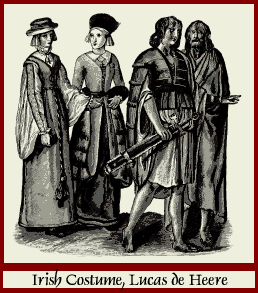Ireland
What does an ordinary Englishman know (or think he knows) about Ireland? Simple beliefs (as opposed to simple facts) are marked with **.
**The weather is dreadful, the morals of the people worse. They need to be dragged kicking and screaming into the civilized 16th century, or be eliminated.
On the other hand, the girls are pretty, buxom, and willing.
**It's nothing but bogs and marshes and Catholics who speak no English or other human tongue.
 On the other hand, there's land in Ireland for the taking for any
gentleman adventurer with the guts to go get it and hang onto it.
On the other hand, there's land in Ireland for the taking for any
gentleman adventurer with the guts to go get it and hang onto it.
**The country is a dagger aimed at England, for use by Spain or any other Catholic power, and thus must be subdued and made as English as possible.
The English Crown never seems to provide enough money, men, or supplies. Ireland just sucks up whatever we send over there, and nothing ever seems to be accomplished.
There has been an English presence in Ireland since 1172, when an Irish king invited English knights in to take care of some earlier invaders.
English government is centered in Dublin and the area around it, called The Pale.
Lord Sussex, Sir Henry Sidney, Sir William FitzWilliam, Lord Grey, and others have taken a shot at governing it with varying degrees of success.
Shane O'Neill and (later) his nephew Hugh O'Neill give us the most trouble in the northern parts of Ireland. The English title they hold is Earl of Tyrone. Gerald Fitzgerald Earl of Desmond, with his cousins, gives us the most trouble in the southern parts.
The earls of Ormond and Kildare are our allies; Kildare's mother was English, and he is married to Lady Southampton's sister Mabel.
The English in general behave very badly while on duty in Ireland, even gentlemen of otherwise pleasant disposition. Must be the rain.
A Map of Ireland c. 1500 showing the Pale and the Great Lordships
Good Reading:
- The Twilight Lords, Richard Berleth (history)
- Itineraries, Fynes Morrison (1601-primary text)
- Image of Irland, John Derrick (1597-primary text with woodcuts)
- Itineraries, Fynes Morrison (1601-primary text)





26 March 2008 mps
